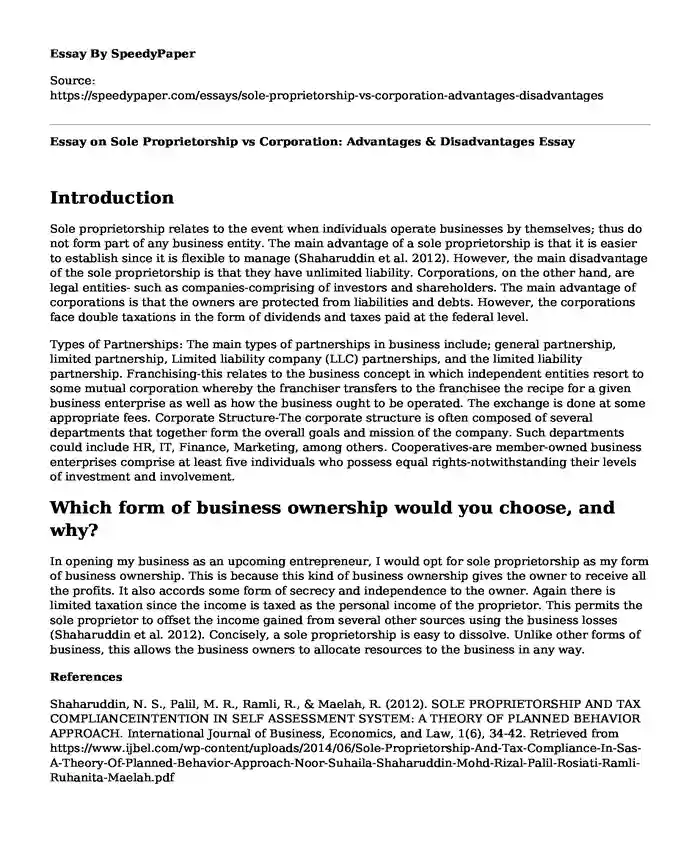Introduction
Sole proprietorship relates to the event when individuals operate businesses by themselves; thus do not form part of any business entity. The main advantage of a sole proprietorship is that it is easier to establish since it is flexible to manage (Shaharuddin et al. 2012). However, the main disadvantage of the sole proprietorship is that they have unlimited liability. Corporations, on the other hand, are legal entities- such as companies-comprising of investors and shareholders. The main advantage of corporations is that the owners are protected from liabilities and debts. However, the corporations face double taxations in the form of dividends and taxes paid at the federal level.
Types of Partnerships: The main types of partnerships in business include; general partnership, limited partnership, Limited liability company (LLC) partnerships, and the limited liability partnership. Franchising-this relates to the business concept in which independent entities resort to some mutual corporation whereby the franchiser transfers to the franchisee the recipe for a given business enterprise as well as how the business ought to be operated. The exchange is done at some appropriate fees. Corporate Structure-The corporate structure is often composed of several departments that together form the overall goals and mission of the company. Such departments could include HR, IT, Finance, Marketing, among others. Cooperatives-are member-owned business enterprises comprise at least five individuals who possess equal rights-notwithstanding their levels of investment and involvement.
Which form of business ownership would you choose, and why?
In opening my business as an upcoming entrepreneur, I would opt for sole proprietorship as my form of business ownership. This is because this kind of business ownership gives the owner to receive all the profits. It also accords some form of secrecy and independence to the owner. Again there is limited taxation since the income is taxed as the personal income of the proprietor. This permits the sole proprietor to offset the income gained from several other sources using the business losses (Shaharuddin et al. 2012). Concisely, a sole proprietorship is easy to dissolve. Unlike other forms of business, this allows the business owners to allocate resources to the business in any way.
References
Shaharuddin, N. S., Palil, M. R., Ramli, R., & Maelah, R. (2012). SOLE PROPRIETORSHIP AND TAX COMPLIANCEINTENTION IN SELF ASSESSMENT SYSTEM: A THEORY OF PLANNED BEHAVIOR APPROACH. International Journal of Business, Economics, and Law, 1(6), 34-42. Retrieved from https://www.ijbel.com/wp-content/uploads/2014/06/Sole-Proprietorship-And-Tax-Compliance-In-Sas-A-Theory-Of-Planned-Behavior-Approach-Noor-Suhaila-Shaharuddin-Mohd-Rizal-Palil-Rosiati-Ramli-Ruhanita-Maelah.pdf
Cite this page
Essay on Sole Proprietorship vs Corporation: Advantages & Disadvantages. (2023, Oct 29). Retrieved from https://speedypaper.com/essays/sole-proprietorship-vs-corporation-advantages-disadvantages
Request Removal
If you are the original author of this essay and no longer wish to have it published on the SpeedyPaper website, please click below to request its removal:
- Toyota Company - Marketing and Business Essay Example
- Research Paper Sample on Air Canada and Their Employment Policy
- Essay Sample Describing the Ford Pinto Scandal
- Distributed Leadership and Organizational Change Essay Sample
- Free Essay. Executive Summary for PricewaterhouseCoopers Company
- Free Essay Example on Google on the Chinese Market
- Data Privacy in Information Technology - Free Paper Example
Popular categories





